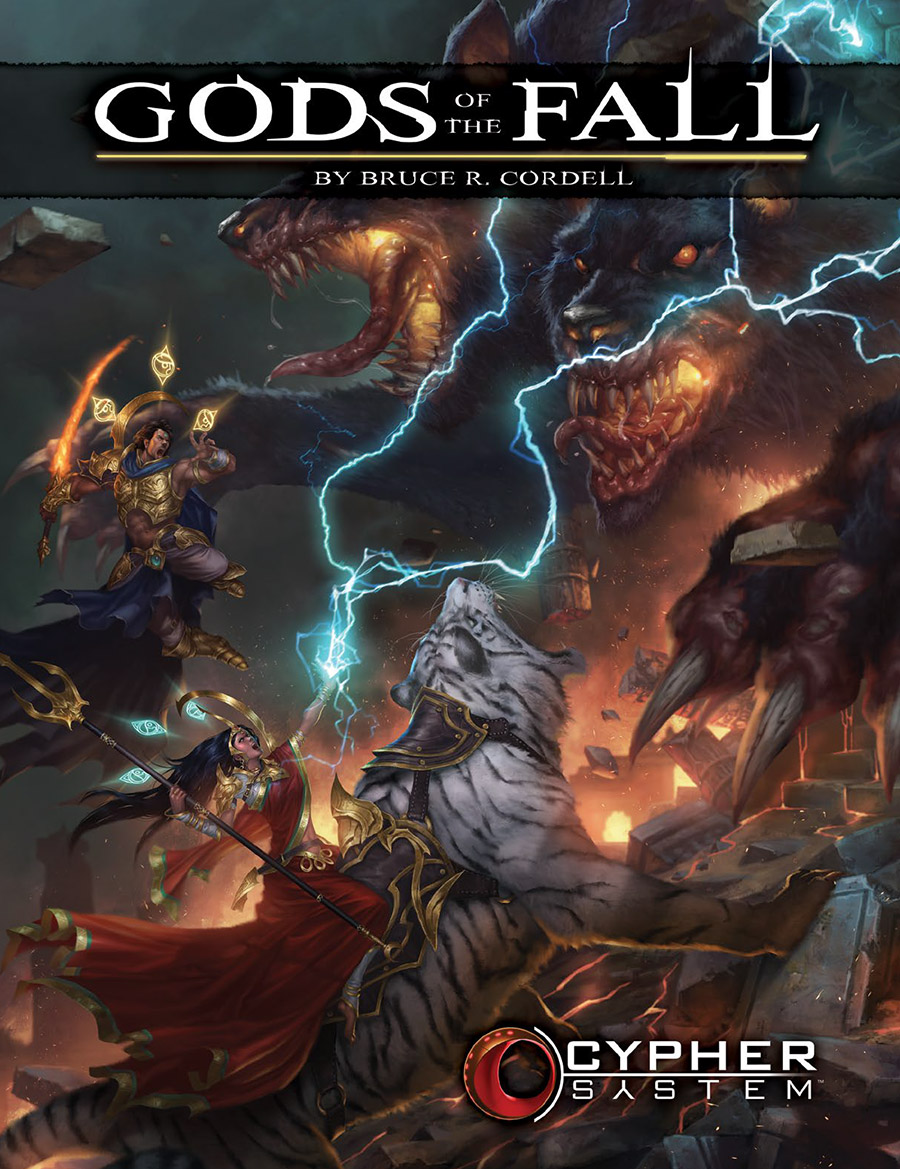Monte Cook Games
has released their newest Cypher System
setting, Gods
of the Fall, (preview only; full release June 22). As a Kickstarter backer, I had early access
to the book. But, rather than read
through the entire 192-page setting book, I thought that it would be fun to
learn about what Gods of the Fall has to offer through the accompanying short
fiction released along with it, 18 page-long Breath of
God by Bruce Cordell (also
lead author and designer on the Gods of the Fall setting). I’ll try and avoid spoilers with the caveats
that things that are obvious will not be considered spoilers. For instance, since Gods of the Fall is about
players assuming the roles of nascent (or possibly reborn, or etc.) gods, it
seems likely that a character in the story—most likely the main character—will be
a nascent god.
Real Fiction; Not Just Setting Intro
Breath of God introduces us to the Gods of the Fall setting
through the eyes of Sabien, who appears to have acquired some sort of divine
spark. As a short piece of fiction,
Breath of God works well. There’s are
multiple, interesting, interwoven conflicts; good main character development;
and a solution to the conflict that doesn’t seem contrived. Cordell does an especially good job creating two
internal conflicts in the main character.
The main character is conflicted about the price paid for his divinity
as well as what acquiring divine spark means for how he should approach his own
future. What’s especially interesting is
how those internal conflicts interact with the two external conflicts to create
a surprise ending.
All the while, Cordell sprinkles in setting details from the
Gods of the Fall setting. It’s a lot
like the world building in the first chapter of a novel, except all the
questions can’t be answered in a mere 18 pages.
The setting elements are built in to the external conflicts in such as a
way that both the story and some of the basics of the campaign setting—like we
have some bad guys called Reconciliators who have some sort of relationship to
the Empress of the eternally dark Nightlands and who hunt gods—are introduced
with a minimum of confusion. There are
lots of conflicts that players can explore in their own home games. Most importantly for longer term campaigns,
we have a lot of mysteries that are set up that will need solving.
Interesting Elements Both Mundane and Fantastic
Finally, Cordell does a great job personalizing the
world. He does this both by highlighting
real world elements that make his setting unique, such as traveling by elephant
rather than by horse-drawn carriage.
That’s neat and I want to know more.
He also seamlessly slips in useful details without disjointing the
reader. Stars are a form of currency;
scholars (of some sort) are referred to as ‘Padi’s. Locations are mentioned, sometimes only to
underscore that they are far away and exotic.
World-building mysteries are also set out, making the
setting more interesting. What are
nimbuses? Why do they surround some
people and objects but not others? Why
can only some people see them? What are
bibliomancers? Especially since traditional RPGs assume that wizards are
spellcasters that derive their power through the study of magic books, what’s
the difference here?
One of the few drawbacks I see is the piece's length. I love a good piece of fiction for my players to learn something about the game and/or the setting. 18 pages (even in large print type) is a little much, especially if they are going to be getting maps, other setting info, and character creation materials. I'd love to see ANY RPG publisher create player-friendly introductions to their settings that are two pages or shorter.
I Like It!
Ultimately, I was a fan.
Of course, since I was also a Kickstarter backer, I was pretty much
hoping to like this. I’m intrigued and
look forward to looking into the mechanics about how Gods of the Fall is
realized through the cypher system. I
look forward to learning more about the conflicts, and what it’s like to play a
nascently-deific character. The story’s
job was to introduce the setting while keeping the reader interested. It did so admirably. I was also impressed by Cordell’s ability to
move beyond typical tie-in fiction and create a real personal conflict that
could have existed (and been interesting) in any story. I recommend taking a read through this either
for your own enjoyment or as a way to whet your appetite for getting into Gods
of the Fall for your next Cypher System game.

No comments:
Post a Comment